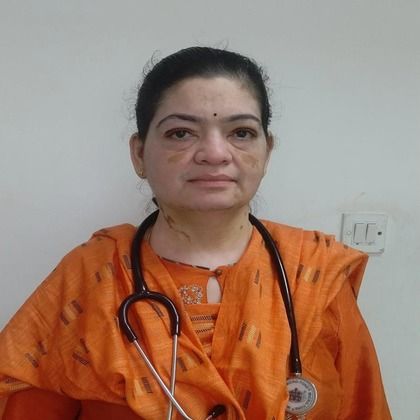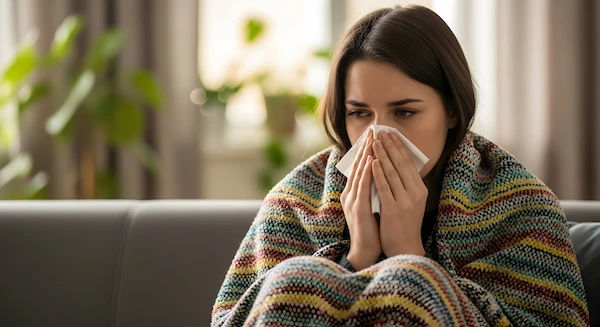How to Reduce Fever in Adults?
Learn effective and safe methods to reduce fever in adults at home. Get practical tips on medication, hydration, rest, and when to seek medical attention.

Written by Dr.Sonia Bhatt
Last updated on 13th Jan, 2026

Fever is a natural sign that your body is fighting off an infection or dealing with another health issue. While it can make you feel uncomfortable, most fevers aren’t serious and tend to go away once the cause is treated. However, if a fever gets too high or lasts too long, it could be a sign of a bigger problem. Here's what you can do to manage a fever in adults safely, and when it's time to reach out to a healthcare professional.
What is Fever?
A fever occurs when your body’s temperature rises above the typical range, commonly 38°C (100.4°F) or higher, and serves as an indication that your immune system is actively fighting an infection. While infections are the most common cause of fever, it can also be triggered by inflammation, heat exhaustion, or other underlying health conditions. In many cases, a mild fever will resolve on its own within a day or two without causing much concern. However, it's always important to pay attention to how you're feeling and know when to seek additional care if the fever persists or becomes more severe.
Symptoms of Fever in Adults
Feeling overheated
Experiencing chills
Achy muscles
Restlessness or difficulty sleeping
General weakness
Sweating
Discomfort or unease
Developing a rash
Persistent headaches
Reduced appetite
How to Reduce Fever in Adults? Practical Tips
Fever can typically be managed at home, and there are several things you can do to help yourself feel more comfortable while your body heals.
Stay Hydrated: It's important to drink plenty of fluids when you have a fever since your body loses more water than usual. Stick to water, but if that feels boring, you can try something like coconut water or electrolyte drinks to help replace lost minerals. Clear broths or herbal teas are also great options if you're not in the mood for anything heavy. Just keep sipping steadily throughout the day to avoid dehydration and keep your energy up.
Get Plenty of Rest: When you have a fever, your body needs extra energy to fight off whatever's causing it. Take it easy — this isn't the time to push yourself. Relax in a quiet room, get some sleep, and let your body focus on recovering. Even short naps or simply lying down can make a big difference.
Wear Comfortable Clothes: Instead of piling on layers to feel warm, try lightweight, breathable clothing. Overdressing can trap heat, which might make you feel worse. If you feel cold, a light blanket can be helpful without overheating you. The goal is to stay cozy, not to raise your temperature even higher.
Cool Compress: A cool compress can really help bring down your fever. Wet a soft cloth with cool water, wring it out, and place it on your forehead, neck, or wrists. These areas help release heat from your body. Make sure to keep refreshing the cloth so it stays cool, and avoid using ice-cold water because it can make you shiver and actually increase your body temperature.
Lukewarm Bath: A lukewarm bath is a gentle way to reduce your fever. Use comfortably warm (not cold) water, and soak for about 10 – 15 minutes. This helps bring down your body temperature without shocking your system. Afterward, pat yourself dry and relax in a cool room.
Take Fever-Reducing Medications: Over-the-counter medicines like acetaminophen or ibuprofen can help lower your fever and ease any aches or pains. Always check the label for the right dosage and avoid aspirin if you're under 19, as it can cause complications. If you're unsure, it's always a good idea to check with a doctor.
Keep Your Environment Cool: A comfortable environment can make a big difference. Keep the room well-ventilated and cool, but avoid any chilly breezes from windows. Use a fan to circulate air if needed, but don't let it blow directly on you. Dim the lights, lower noise levels, and create a peaceful space so you can rest and recover.
Consult Top General Medicine
When to See a Doctor
Understanding when a fever requires medical attention is essential, especially if the temperature exceeds 104°F (40°C) or is accompanied by alarming symptoms, such as:
Seizures
Loss of consciousness
Confusion or disorientation
Stiff neck
Difficulty breathing
Severe pain anywhere in the body
Swelling or inflammation in any area
Unusual or foul-smelling vaginal discharge
Painful urination or urine with a bad odor
Prevention Tips
Preventing fevers often starts with simple habits that promote good health and hygiene. By taking care of yourself and making smart choices, you can reduce your chances of getting sick. Here are some practical tips:
Wash Your Hands Regularly: Make it a routine to wash your hands with soap and water, especially before meals and after using the restroom. Clean hands are one of the best ways to stop germs from spreading.
Avoid Contact with Sick People: If someone around you is feeling unwell, try to keep your distance. This helps protect you from catching their infection.
Practice Proper Hygiene: Always cover your mouth and nose with a tissue when you cough or sneeze, then dispose of the tissue right away. Also, avoid touching your face to keep germs from entering your body.
Stay Hydrated: Drinking enough water each day keeps your immune system working well. If plain water isn’t your favorite, herbal teas or flavored water can make staying hydrated easier.
Eat Healthy Meals: Include plenty of fruits, vegetables, and whole grains in your diet to give your body the vitamins and nutrients it needs to stay strong against illnesses.
Get Plenty of Sleep: A good night’s rest is essential for keeping your immune system in top shape. Aim to get enough sleep to help your body recover and stay resilient.
Exercise Regularly: Staying active boosts your immune system and overall health, making you less likely to fall sick.
Keep Vaccinations Current: Vaccines, like the flu shot, are a simple way to protect yourself from infections that can lead to fever. Talk to your doctor about what’s right for you.
Clean Your Space: Regularly disinfect surfaces around your home, especially in shared spaces. A clean environment helps limit the spread of bacteria and viruses.
Dress for the Weather: Wearing clothes suitable for the temperature prevents your body from getting too hot or too cold, keeping you comfortable and less vulnerable to illness.
Conclusion
A fever often signals that your body is working hard to combat an infection, and in most cases, it’s not something to worry about. Simple home remedies like staying hydrated, resting, and using cooling techniques can usually help ease your discomfort. However, if the fever becomes extremely high, persists for an extended period, or is accompanied by troubling symptoms like intense pain or confusion, it’s essential to consult a doctor. By paying attention to your body's signals and taking the right steps, you can recover more quickly and feel better soon.
Consult Top General Medicine
Consult Top General Medicine

Dr. Rajib Ghose
General Physician/ Internal Medicine Specialist
25 Years • MBBS
East Midnapore
VIVEKANANDA SEBA SADAN, East Midnapore

Dr. Aakash Garg
Gastroenterology/gi Medicine Specialist
12 Years • MBBS, DNB (Medicine), DrNB (Gastroentrology).
Bilaspur
Apollo Hospitals Seepat Road, Bilaspur
(150+ Patients)

Dr. S Vijayaraghavan
General Physician/ Internal Medicine Specialist
31 Years • MD (Gen. Med.)
Chennai
Apollo Speciality Hospitals OMR, Chennai
(175+ Patients)

Dr. Vijayalakshmi S
General Physician/ Internal Medicine Specialist
17 Years • MBBS, MDRC, PGDHS
Bengaluru
Apollo Medical Center, Marathahalli, Bengaluru

Dr. Chaithra H
General Physician/ Internal Medicine Specialist
6 Years • MBBS, MD General Medicine, DNB General Medicine
Bangalore
Apollo 24|7 Clinic - Karnataka, Bangalore
Consult Top General Medicine

Dr. Rajib Ghose
General Physician/ Internal Medicine Specialist
25 Years • MBBS
East Midnapore
VIVEKANANDA SEBA SADAN, East Midnapore

Dr. Aakash Garg
Gastroenterology/gi Medicine Specialist
12 Years • MBBS, DNB (Medicine), DrNB (Gastroentrology).
Bilaspur
Apollo Hospitals Seepat Road, Bilaspur
(150+ Patients)

Dr. S Vijayaraghavan
General Physician/ Internal Medicine Specialist
31 Years • MD (Gen. Med.)
Chennai
Apollo Speciality Hospitals OMR, Chennai
(175+ Patients)

Dr. Vijayalakshmi S
General Physician/ Internal Medicine Specialist
17 Years • MBBS, MDRC, PGDHS
Bengaluru
Apollo Medical Center, Marathahalli, Bengaluru

Dr. Chaithra H
General Physician/ Internal Medicine Specialist
6 Years • MBBS, MD General Medicine, DNB General Medicine
Bangalore
Apollo 24|7 Clinic - Karnataka, Bangalore




